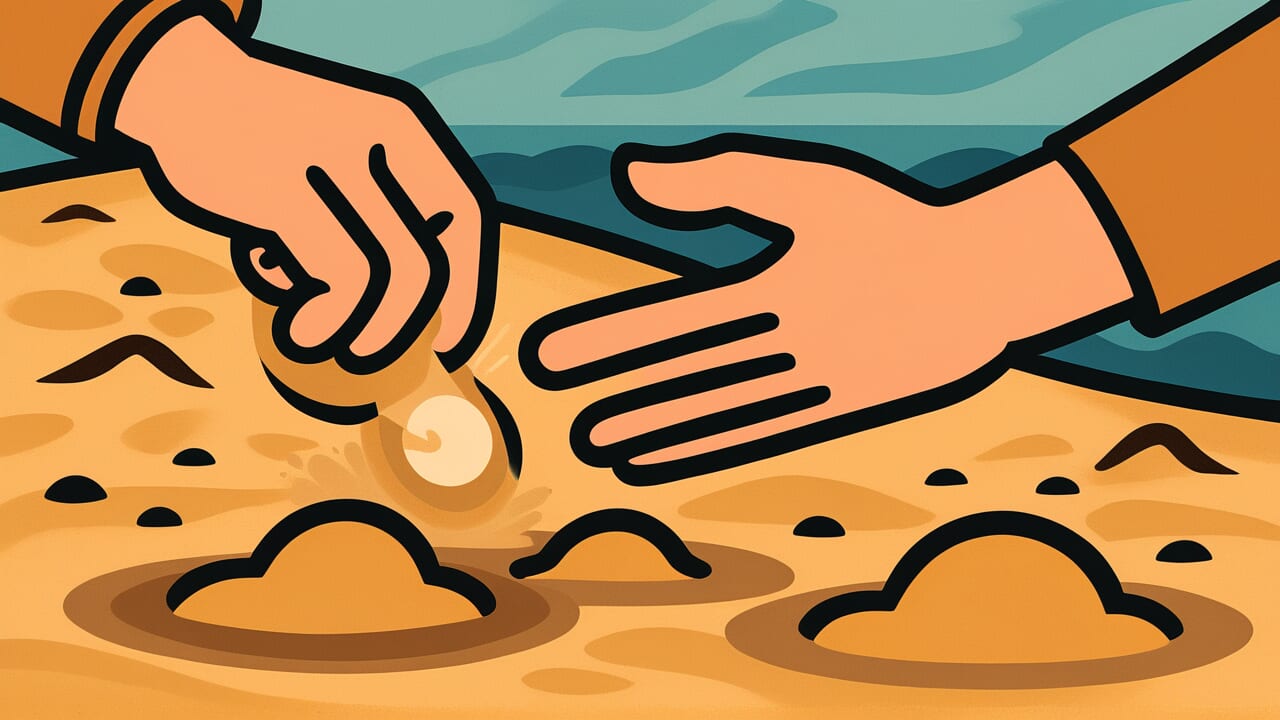How to Read “A jewel comes out from the bottom of the sand”
Suna no soko kara tama ga deru
Meaning of “A jewel comes out from the bottom of the sand”
“A jewel comes out from the bottom of the sand” is a proverb that describes how excellent people or valuable things can emerge from humble backgrounds and seemingly unremarkable places.
This proverb teaches us not to judge people or things based only on their appearance or origins.
People use it when praising someone who succeeded despite difficult circumstances. It’s also used to encourage others by showing belief in their potential.
The expression works well because it creates a vivid contrast. Sand represents something worthless and common, while a jewel represents something precious and rare.
This contrast makes the message memorable and powerful.
Even in modern society, many talented people bloom without privileged education or family background. This proverb affirms their efforts and possibilities, offering hope to everyone.
Origin and Etymology
No specific historical text marks the first appearance of this proverb. However, we can learn much from examining how the words work together.
“The bottom of the sand” symbolizes something seemingly worthless and easily overlooked. Sand consists of tiny particles, and the bottom layer is even less visible.
Meanwhile, “jewel” has represented nobility and value since ancient times in Japan. It refers to gemstones and beautiful stones that people treasured.
This contrast reflects traditional Japanese values. Even during the strict class system before the Edo period, people observed that talent and character appeared regardless of birth.
History records many individuals from farmer or merchant families who achieved greatness in scholarship or arts.
Real-life experiences also likely influenced this proverb’s creation. People actually found beautiful stones and shells in river or ocean sand.
These everyday observations of nature evolved into metaphors expressing human truths. The phrase sounds simple and memorable, making it easy to spread through oral tradition.
Usage Examples
- He came from a poor family, but truly “a jewel comes out from the bottom of the sand” – now he’s become a respected researcher
- That company started as a small town factory, but you could say “a jewel comes out from the bottom of the sand” describes their remarkable growth
Universal Wisdom
“A jewel comes out from the bottom of the sand” carries a deep wish for hope and fairness in human society.
In any era, people cannot choose where they’re born. However, looking back through human history shows that talent and noble character never belonged only to the privileged class.
In fact, difficult environments sometimes forge people and produce individuals of true value.
This proverb has been passed down for generations because it’s not just idealism. It reflects truth that people have actually witnessed.
Even in the most unremarkable places, even in the harshest environments, brilliant potential lies hidden. This recognition has given society vitality and offered people hope.
At the same time, this proverb questions how we look at others. Finding valuable things requires more than surface-level observation.
You need insight to see essence. You need to abandon prejudice and stereotypes.
You need a heart that believes in each person’s possibilities. That’s the wisdom of finding jewels in sand.
Human dignity exists not in birth or environment, but within each person. This proverb continues to speak this universal truth quietly yet powerfully.
When AI Hears This
Sand mixed with countless particles in disorder represents what physics calls a high-entropy state. Entropy simply means “degree of randomness.”
According to the second law of thermodynamics, nature should always move toward more disorder. So why would a valuable jewel emerge from this chaos?
Here lies an interesting paradox. Actually, “a jewel coming out” allows two interpretations.
First, the jewel existed all along, and sifting through sand reveals it. This is an information selection process.
Second, sand particles naturally gather under certain conditions and form jewel-like structures. This latter case is called a dissipative structure.
In non-equilibrium states where energy flows in, order actually emerges spontaneously.
For example, when wind blows across a desert, sand grains create regular wave patterns. In riverbeds, stones of specific sizes sometimes collect in one spot.
These show how random particles self-organize when external energy is applied. In other words, given the right conditions within chaotic sand, jewels can naturally “appear.”
This proverb anticipated a deep insight from modern physics. Chaos and order don’t oppose each other.
Rather, the possibility of order being born exists within chaos itself.
Lessons for Today
This proverb teaches modern people a hopeful truth. Possibilities sleep in unexpected places.
You might sometimes feel like you’re in an environment like “the bottom of the sand.” You might think you’re less fortunate than others, or that nobody notices you.
But this proverb teaches something important. Wherever you are right now, a “jewel” that shines when polished definitely exists within you.
At the same time, this proverb changes how you see others. Before judging people by their titles or appearance, try to see their essence.
This attitude might bring encounters that enrich your own life.
In modern society, social media highlights only glamorous parts. But truly valuable things often grow quietly in unremarkable places.
Don’t rush. Believe in your own possibilities. And believe in others’ possibilities too.
Having both perspectives is the greatest gift this proverb offers to modern people.



Comments